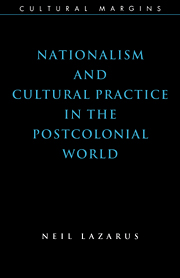Book contents
- Frontmatter
- Contents
- Acknowledgments
- Introduction: hating tradition properly
- 1 Modernity, globalization, and the “West”
- 2 Disavowing decolonization: nationalism, intellectuals, and the question of representation in postcolonial theory
- 3 Cricket, modernism, national culture: the case of C. L. R. James
- 4 “Unsystematic fingers at the conditions of the times”: Af ropop and the paradoxes of imperialism
- Notes
- Bibliography
- Index
- Cultural Margins
Introduction: hating tradition properly
Published online by Cambridge University Press: 02 December 2009
- Frontmatter
- Contents
- Acknowledgments
- Introduction: hating tradition properly
- 1 Modernity, globalization, and the “West”
- 2 Disavowing decolonization: nationalism, intellectuals, and the question of representation in postcolonial theory
- 3 Cricket, modernism, national culture: the case of C. L. R. James
- 4 “Unsystematic fingers at the conditions of the times”: Af ropop and the paradoxes of imperialism
- Notes
- Bibliography
- Index
- Cultural Margins
Summary
Nationalism and Cultural Practice in the Postcolonial World is a book about the social trajectories of culture in the modern world system. The book comprises individual chapters on modernity, globalization, and the “West”; the conceptualization of nationalism in postcolonial studies; cricket and popular consciousness in the English-speaking Caribbean; and African pop music. It is intended as a self-consciously Marxist contribution to the academic field of postcolonial studies – one capable of suggesting a credible historical materialist alternative to the idealist and dehistoricizing scholarship currently predominant in that field in general. If I were asked to summarize the sustaining argument of the book – to say in a single sentence or less what the book as a whole was about – I would propose the rubric of “hating tradition properly.”
I derive this notion of “hating tradition properly” from Theodor W. Adorno's fraught yet inexhaustibly rewarding work, Minima Moralia, which was first published in Germany in 1951 (although it had been written in exile during the dark war-era years of the 1940s). A particular fragment in Minima Moralia is entitled “Savages are not more noble” (Die Wilden sind nicht bessere Menschen: literally, “Savages are not better men”). At one and the same time smugly condescending and explosively radical, irretrievably Eurocentric and urgently anti-capitalist, it features Adorno at his most enigmatic and Olympian:
“One must have tradition in oneself, to hate it properly” (um sie recht zu hassen). The proposition will no doubt strike many contemporary readers as being noteworthy chiefly for its elitism; and its unabashed cultural supremacism, too, will surely loom to politically progressive thinkers as a liability, embarrassing if not positively reactionary.
- Type
- Chapter
- Information
- Publisher: Cambridge University PressPrint publication year: 1999
- 1
- Cited by

